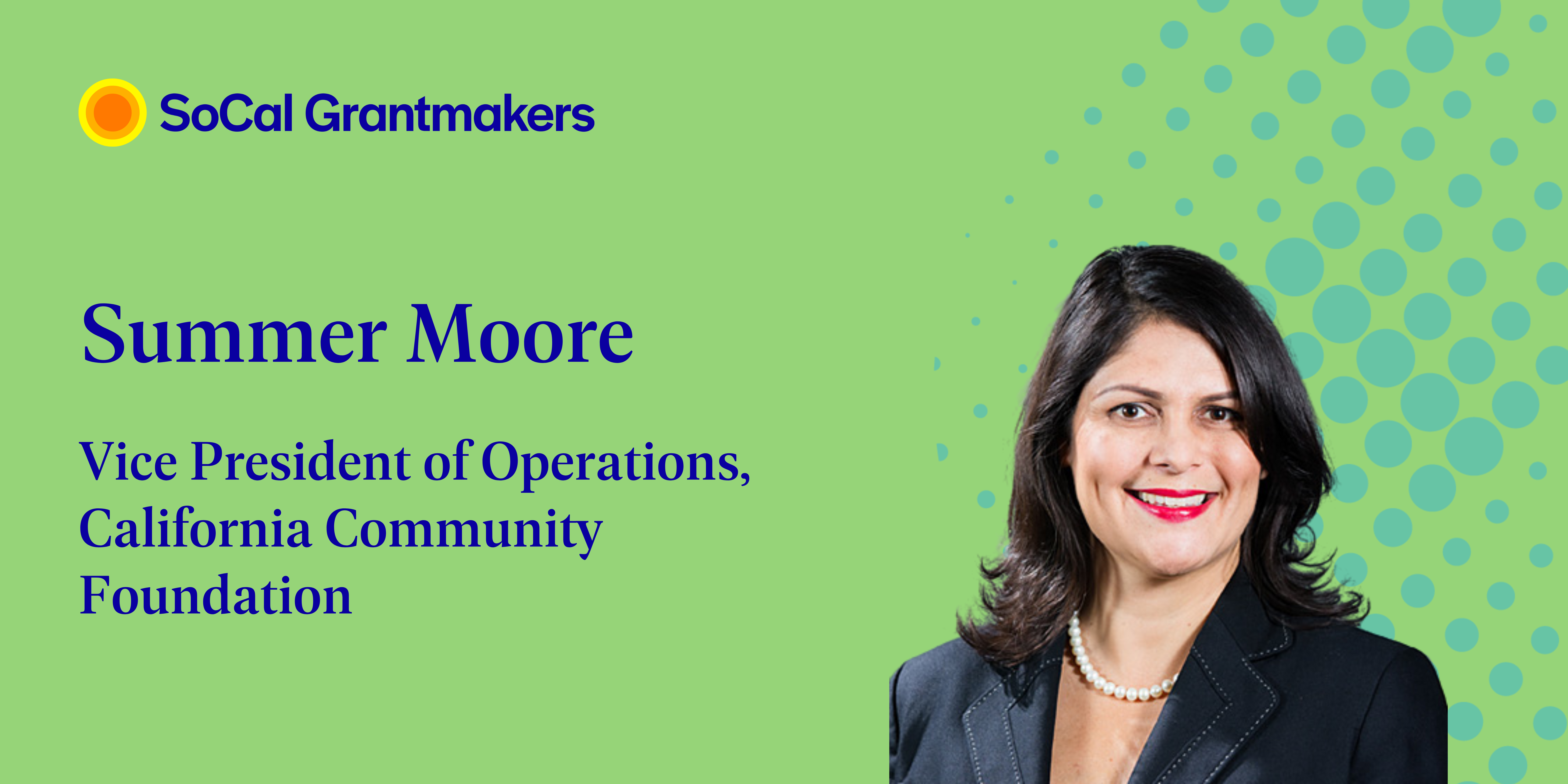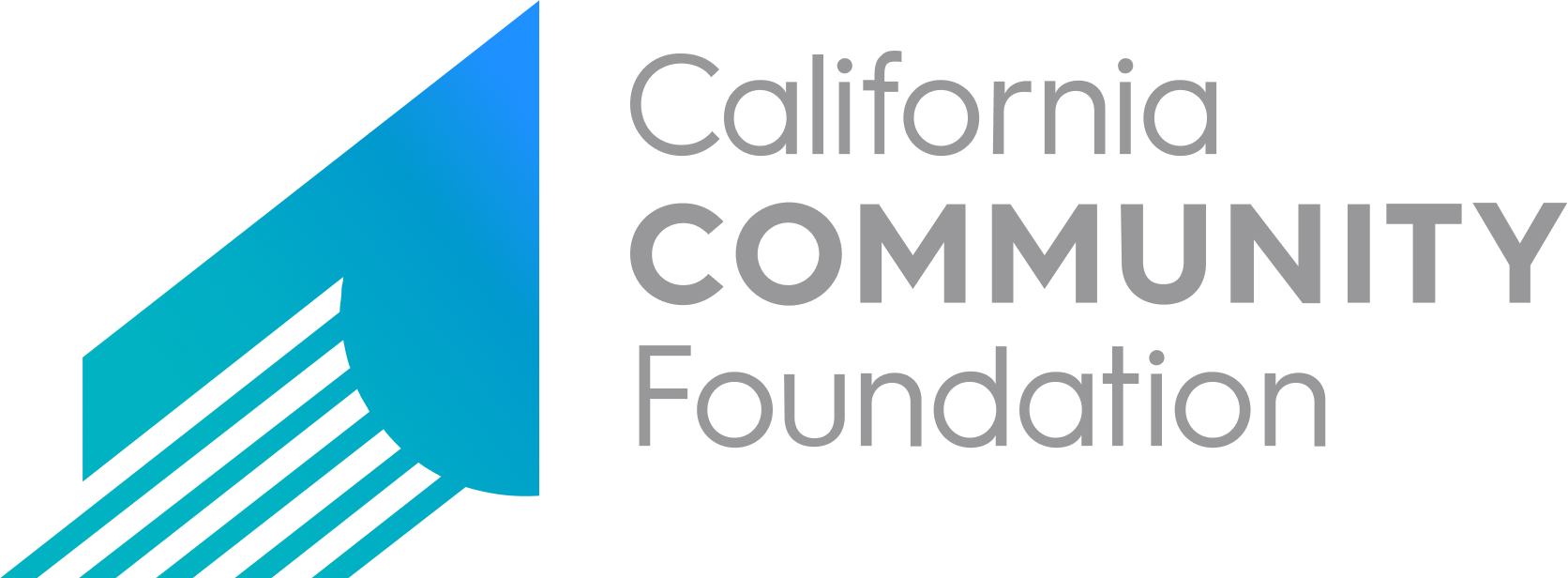Welcoming Summer Moore to SCG's Board of Directors!

SoCal Grantmakers is proud to announce that Shaheen Kassim-Lakha (Senior Director of Strategic Partnerships, Conrad Hilton Foundation) and Summer Moore (Vice President of Operations at the California Community Foundation) recently joined SCG’s Board of Directors. We invite you to learn more about our new board member, Summer, by reading her bio and our conversation below. Learn more about SCG’s Board of Directors.
Summer Moore is the Vice President of Operations at the California Community Foundation. She is responsible for strengthening the foundation’s infrastructure and day-to-day operations to serve grantees, donors, corporate and foundation partners, and stakeholders. Her areas of oversight include Information Technology, Public Grant Compliance, Grants Management, Development, and Donor Operations. Her role also oversees CCF’s partnerships with government and building a business line to direct government funding streams and resources to L.A. nonprofits.
Summer started at the foundation in 2001 as a Grants Coordinator for donor-advised fund grantmaking, was appointed Accounting Manager in 2005, and Director of Continuous Improvement in 2010. She then served as Director of Development and Donor Operations before being named Vice President of Operations in 2021. Summer is also a board member of the CCF Community Initiatives Fund, which holds over $40 million in assets and provides fiscal sponsor and support services to select L.A. area projects. Summer received her bachelor’s degree in Latin American & Latino Studies at the University of California, Santa Cruz.
What led you to pursue a career in the social impact sector?
It all comes back to family values and how I was raised. I grew up with my Mexican-American grandparents, who served in World War II. They spent a lot of time in early civil rights groups with the American G.I. Forum, where they advocated for the rights of Mexican G.I.’s and resources for them, such as housing, education, and healthcare. They would take me to the chapter meetings they attended every other week. From a young age, I understood that there was a lack of access and rights afforded to everyone. They taught me that everyone has an inherent right to resources and how I could advocate for others. These values were part of our family structure. When I arrived at CCF, I found similar values baked into the foundation’s DNA through its advocacy for people’s fundamental rights to resources.
You’ve worked in various internal-facing roles at the California Community Foundation for 20+ years. Tell us about your approach to infrastructure work and how it connects to CCF’s external efforts.
On the one hand, you have the external face of what the California Community Foundation does and represents in the community. On the other, you have the organization’s infrastructure that helps it run efficiently and effectively. In my tenure at CCF, I’ve always worked on the internal mechanics of the organization. My work has included ensuring that our grants get out effectively, collaborating with our finance department on budgeting, and improving our systems and technology with our I.T. team. Our priority is doing the best we can with the least resources possible so that most of our assets get out to the community. I am dedicated to being strategic with our resources so we can be responsible stewards of the assets entrusted to us and ultimately improve the lives of the nonprofits we serve and the recipients of their services. The way I see it, the California Community Foundation is different from other grantmakers because our assets come from generations of generosity. CCF is 107 years old, meaning donors, families, and community members have entrusted us with their hope for over a hundred years! I see myself as one blip in a long chain of hope.
What is the role of organizational culture in your work, and what internal shifts have you seen during your time at CCF?
Many folks are grappling with the question of organizational culture today. Collectively, we’ve realized that it can’t just be about the work we’re doing in the community or how we’re allocating resources. It’s also about how we build an organizational culture that supports our external efforts and fights against harm. It’s how we interact with ourselves, peers, and our stakeholders. It’s a confluence of all of these priorities and an ongoing challenge. It requires constant reflection, adaptation, and commitment to improving internal processes that then get reflected externally.
For example, when I started working at the foundation in 2001, the world was a different place. It was before the “.com bust” and September 11th. During this time, the foundation felt like a safe place to be. But sometimes, “safe” doesn’t translate to the most impactful environment, right? As the world changed — and continues to change — so did the foundation. The cultural evolution I have enjoyed witnessing at the institution is the shift away from a grant-first culture, where a grantmaker just hands a check to a grantee. We no longer lead with a check. We start by engaging communities, utilizing advocacy, and helping everyday citizens leverage their voices and license. Our focus now is on policy change and building communities. Once you incorporate all these other forms of leadership, your check becomes a catalyst for change in a way it wasn’t before. And I think that’s been the foundation’s arc since I started here — evolving from safe to catalytic.
Please share more about your current work and priorities at CCF.
Like every institution, CCF is affected by the stock market and the affairs of the global economy. But, even though our endowment has changed and shifted, what matters most to us are the lives of everyday Angelenos in underserved communities affected by the economy tenfold. How do regular residents feel about essentials such as food, gas, and inflation? These are powerful forces, and people today must make tough decisions. As great as philanthropy is, it’s just a drop in the bucket in solving these issues. The truth is we won’t solve the housing and homelessness crisis through philanthropy.
For this reason, CCF has embarked on several public-private partnerships designed to allocate resources to historically under-resourced communities. These partnerships are present at various jurisdictional levels: city government, county government, and state government. We are actively advocating for nonprofits that have historically been left out of the government funding equation. Recently, CCF has been serving as a pass-through entity to acquire government resources that are difficult to access. While it takes more than just resources to solve a problem, in many cases, our governments are more equipped and resourced to address these long-standing issues. Being able to help channel resources to nonprofits that are usually omitted from the funding equation is an impactful step forward. I am proud to see CCF make this evolution where we are partnering with government. Today we are working with the government to move the needle on critical issues while integrating with other strategies such as public policy and advocacy.
What does leadership mean to you?
Leadership is often confused with a title or achievement like joining a board. I struggle with that perception. What’s meaningful to me is everyday leadership. I see everyday leadership in a woman fleeing domestic violence, a parent supporting their children in school, and a nurse advocating for a patient. For me, leadership is about service to others, not a title or position of power. I am inspired by the everyday leaders I’ve encountered throughout my life. That’s what matters to me.
What excites you most about being a new member of SCG’s Board of Directors?
Since I started at California Community Foundation, I’ve known SCG to be a place where I could learn and grow. Throughout my 20+ year membership, I’ve seen the power of coming together with peers to enact change. SCG remains an incredible forum for funders to address our collective issues and implement solutions that genuinely support our nonprofit partners doing critical work. As a new board member, I am excited to continue evolving alongside grantmakers and collaborating in new ways to forward equity and justice in our communities. For me, the catalytic power of philanthropy is the recognition that we can’t do this work alone. What gives me hope today is all the ways I see my peers leaning on one another.
